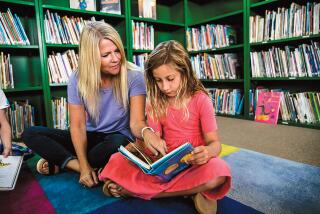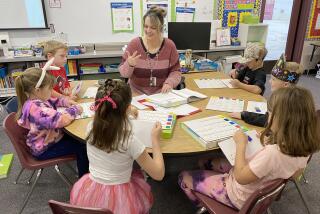Big Read: Right or wrong?
- Share via
Re “Big Read, big waste,” Opinion, Feb. 25
Jim Henley is right about the National Endowment of the Arts’ Big Read plan to encourage reading: Its elitist approach is like trying to deal with hunger with wine-tasting parties. Also, it is not clear that we are reading less. Studies show that in 1945, only 21% said they read something yesterday. In 1991, it was 31%, and in 2006, 38%, suggesting an increase in reading. Test scores show that reading ability has not declined. Fourth- and eighth-grade reading scores have not decreased since 1984. Twelfth-grade scores have dropped only four points since 1984 and are the same as they were in 1971.
The real problem is that children of poverty have little to read at home, in school or in their communities. As a result, they don’t read very much or very well.
The Big Read is a bad solution that addresses the wrong problem.
Stephen Krashen
Los Angeles
The writer is professor emeritus at USC’s Rossier School of Education.
--
Last week, a woman in St. Helens, Ore., thanked a nationwide program called the Big Read for getting her teenage son to dive into Dashiell Hammett’s “The Maltese Falcon” -- thanks I keep hearing, in different words, all across the country. But this Op-Ed article called the one-city, one-book initiative from the National Endowment for the Arts silly and sentimental, and asked incredulously, “Who could be inspired?”
Don’t take my word for its effectiveness. Ask any of the roughly 500 people who jammed a Big Read event last April in Santa Clarita to cheer for Ray Bradbury; or see for yourself, by attending any of dozens of Eastside events this spring celebrating Rudolfo Anaya’s novel, “Bless Me, Ultima.”
Who could be inspired by such “unobjectionable” writers as Hammett, Bradbury, Anaya and Cynthia Ozick? Everybody from poor kids in East St. Louis to a Los Angeles now reeling from the impending closure of Dutton’s Books, to a cynical Angeleno ex-book critic like me. The NEA encourages all people to help arrest and, ideally, reverse the American reading decline in any way they choose, but the Big Read is working.
David Kipen
Literature Director
National Reading
Initiatives, Washington
--
Reading Henley’s indictment of the Big Read program, I felt as if I were watching a schoolyard bully tormenting a mild-mannered classmate out of spite. In a world of countless more worthy objects of scorn, why attack an unassuming program, its modest goal and its comparatively tiny price tag? OK, so the Big Read may not single-handedly turn us into a nation of readers. But for all we know, its low-impact, grass-roots approach may be generating handsome returns for its paltry cost.
In my book, you should light a candle even if it won’t dispel a universe of darkness; you should fight a battle even if it doesn’t alone decide a war; and you should offer a program to inspire people to read even if it may not single-handedly revive the fiction industry.
Steven Stathatos
La Canada Flintridge
More to Read
Sign up for our Book Club newsletter
Get the latest news, events and more from the Los Angeles Times Book Club, and help us get L.A. reading and talking.
You may occasionally receive promotional content from the Los Angeles Times.








